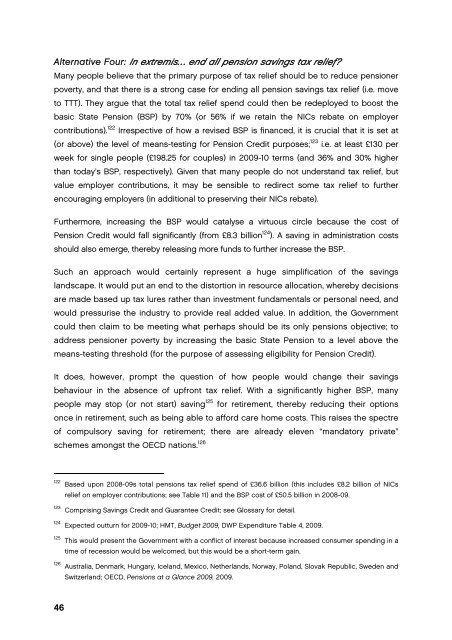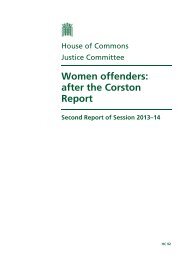Simplification is the key - Centre for Policy Studies
Simplification is the key - Centre for Policy Studies
Simplification is the key - Centre for Policy Studies
Create successful ePaper yourself
Turn your PDF publications into a flip-book with our unique Google optimized e-Paper software.
Alternative Four: In extrem<strong>is</strong>… end all pension savings tax relief?<br />
Many people believe that <strong>the</strong> primary purpose of tax relief should be to reduce pensioner<br />
poverty, and that <strong>the</strong>re <strong>is</strong> a strong case <strong>for</strong> ending all pension savings tax relief (i.e. move<br />
to TTT). They argue that <strong>the</strong> total tax relief spend could <strong>the</strong>n be redeployed to boost <strong>the</strong><br />
basic State Pension (BSP) by 70% (or 56% if we retain <strong>the</strong> NICs rebate on employer<br />
contributions). 122 Irrespective of how a rev<strong>is</strong>ed BSP <strong>is</strong> financed, it <strong>is</strong> crucial that it <strong>is</strong> set at<br />
(or above) <strong>the</strong> level of means-testing <strong>for</strong> Pension Credit purposes; 123 i.e. at least £130 per<br />
week <strong>for</strong> single people (£198.25 <strong>for</strong> couples) in 2009-10 terms (and 36% and 30% higher<br />
than today’s BSP, respectively). Given that many people do not understand tax relief, but<br />
value employer contributions, it may be sensible to redirect some tax relief to fur<strong>the</strong>r<br />
encouraging employers (in additional to preserving <strong>the</strong>ir NICs rebate).<br />
Fur<strong>the</strong>rmore, increasing <strong>the</strong> BSP would catalyse a virtuous circle because <strong>the</strong> cost of<br />
Pension Credit would fall significantly (from £8.3 billion 124 ). A saving in admin<strong>is</strong>tration costs<br />
should also emerge, <strong>the</strong>reby releasing more funds to fur<strong>the</strong>r increase <strong>the</strong> BSP.<br />
Such an approach would certainly represent a huge simplification of <strong>the</strong> savings<br />
landscape. It would put an end to <strong>the</strong> d<strong>is</strong>tortion in resource allocation, whereby dec<strong>is</strong>ions<br />
are made based up tax lures ra<strong>the</strong>r than investment fundamentals or personal need, and<br />
would pressur<strong>is</strong>e <strong>the</strong> industry to provide real added value. In addition, <strong>the</strong> Government<br />
could <strong>the</strong>n claim to be meeting what perhaps should be its only pensions objective; to<br />
address pensioner poverty by increasing <strong>the</strong> basic State Pension to a level above <strong>the</strong><br />
means-testing threshold (<strong>for</strong> <strong>the</strong> purpose of assessing eligibility <strong>for</strong> Pension Credit).<br />
It does, however, prompt <strong>the</strong> question of how people would change <strong>the</strong>ir savings<br />
behaviour in <strong>the</strong> absence of upfront tax relief. With a significantly higher BSP, many<br />
people may stop (or not start) saving 125 <strong>for</strong> retirement, <strong>the</strong>reby reducing <strong>the</strong>ir options<br />
once in retirement, such as being able to af<strong>for</strong>d care home costs. Th<strong>is</strong> ra<strong>is</strong>es <strong>the</strong> spectre<br />
of compulsory saving <strong>for</strong> retirement; <strong>the</strong>re are already eleven “mandatory private”<br />
schemes amongst <strong>the</strong> OECD nations. 126<br />
122 Based upon 2008-09s total pensions tax relief spend of £36.6 billion (th<strong>is</strong> includes £8.2 billion of NICs<br />
relief on employer contributions; see Table 11) and <strong>the</strong> BSP cost of £50.5 billion in 2008-09.<br />
123 Compr<strong>is</strong>ing Savings Credit and Guarantee Credit; see Glossary <strong>for</strong> detail.<br />
124 Expected outturn <strong>for</strong> 2009-10; HMT, Budget 2009, DWP Expenditure Table 4, 2009.<br />
125 Th<strong>is</strong> would present <strong>the</strong> Government with a conflict of interest because increased consumer spending in a<br />
time of recession would be welcomed, but th<strong>is</strong> would be a short-term gain.<br />
126 Australia, Denmark, Hungary, Iceland, Mexico, Ne<strong>the</strong>rlands, Norway, Poland, Slovak Republic, Sweden and<br />
Switzerland; OECD, Pensions at a Glance 2009, 2009.<br />
46

















